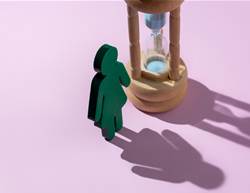For decades, menopause has been a topic quietly avoided—often even by medical professionals. As a result, many women reach this phase of life feeling confused, dismissed, or misdiagnosed. And when symptoms fall outside the usual hot flushes and night sweats, it’s easy to feel even more alone.
Unexpected signs of menopause
One commonly overlooked symptom is heart palpitations. A 2022 study published in Women’s Health confirms that palpitations are relatively common during the menopause transition, yet they often go unconnected to hormonal changes. More research is needed to understand why they affect some people more than others, but emerging data suggest that factors such as sleep quality, physical activity, and emotional wellbeing may play a role.
Another under-discussed symptom? Brain fog. Difficulty concentrating, memory lapses, and a general sense of mental fatigue can be disorienting—especially for people who are used to feeling sharp and focused. This cognitive shift is often brushed off or misattributed to ageing or stress, when in fact it could signal a drop in oestrogen levels during perimenopause.
Why GPs may miss the signs
One of the biggest hurdles in addressing menopause symptoms is misdiagnosis. Many women report being offered antidepressants or heart medication without any discussion of perimenopause or menopause. It’s not uncommon for GPs to treat individual symptoms without considering hormonal health as the root cause—especially if the patient hasn’t had a hot flush or hasn’t yet reached their 50s.
That’s why awareness and education are so important. Recognising symptoms like mood changes, sleep disturbances, and heart palpitations as potential signs of hormonal transition can empower women to ask the right questions and seek targeted care.
Perimenopause vs menopause
Perimenopause typically begins in the late 30s to early 40s and is marked by fluctuating hormone levels. During this time, the ovaries start producing less oestrogen, which can trigger a range of physical and emotional symptoms. Menopause itself is defined as the point at which a person has not had a period for 12 consecutive months.
The experience can vary widely. Some people breeze through it with few symptoms, while others struggle with everything from joint pain and anxiety to severe fatigue and cognitive changes.
Treatment options for menopause symptoms
The good news is that effective support exists. From hormone therapy and non-hormonal medications to lifestyle adjustments, there are many ways to manage symptoms and protect long-term health. As board-certified gynaecologist Dr Ann Cha said, “Women don’t have to suffer through it. There are options.”
The key is bringing the conversation out of the shadows. The more we normalise speaking openly about menopause—and all the ways it can show up—the better equipped we are to navigate it with confidence and care.









